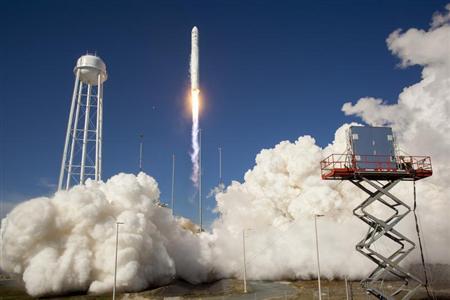
"Liftoff, on the shoulders of Atlas," NASA spokesman Mike Curie said as the unmanned spacecraft blasted off from Cape Canaveral, Florida atop a white Atlas V rocket at 4:44 pm (2144 GMT).
UK astronaut to take part in London marathon from space
The launch marks Orbital's fourth scheduled mission to the orbiting outpost, as part of a $1.9 billion contract with NASA to deliver necessities to the astronauts living in space.
The spacecraft is carrying the most cargo ever packed onto a barrel-shaped Cygnus, with some 7,300 pounds of gear, including science experiments, ready-made food, a jet pack for spacewalking astronauts and even a satellite made by elementary school students.
In October 2014, an Orbital Antares rocket packed with thousands of pounds of supplies exploded seconds after takeoff, marking the first catastrophic failure since private companies began resupplying the orbiting outpost in 2010.
It was followed eight months later by a SpaceX rocket explosion, and the consecutive accidents effectively shut off the flow of US supplies to astronauts in orbit.
Orbital ATK and SpaceX -- which has a contract worth $1.6 billion to send food and equipment to the research lab over a series of supply trips -- are the only two US companies that can send spacecraft to the ISS.
A Russian Progress ship was also lost after launch in April, but ISS program managers said the astronauts were never in danger and still have several months of supplies in storage.
Orbital ATK arranged to use United Launch Alliance's Atlas V rocket while it upgrades its Antares rocket, which failed due to a problem with its reconditioned Ukrainian engine.
The company said after the accident that a control operator detected a suspected rocket engine failure, and the rocket was purposefully detonated to prevent damage to people in the area.
Letter to Mars? Royal Mail works it out for British boy, 5
The blast cost Orbital at least $200 million in lost equipment and supplies.
The liftoff Sunday atop the Atlas V rocket went smoothly, with no flaws or problems after a launch delay of several days due to bad weather.
"The countdown was exceptionally smooth. It was one of those countdowns that makes them look kind of boring," said Vern Thorp, mission manager for United Launch Alliance.
"We had a pretty clean flight, too, everything happened right on time... This is about as good as it gets."
The spacecraft should arrive at the space station on Wednesday.
Astronauts will use the Canadian-made robotic arm to grapple the spacecraft at around 6:10 am (1110 GMT), NASA said.

1726117332-0/Megan-Thee-Stallion-(1)1726117332-0-165x106.webp)





















COMMENTS
Comments are moderated and generally will be posted if they are on-topic and not abusive.
For more information, please see our Comments FAQ